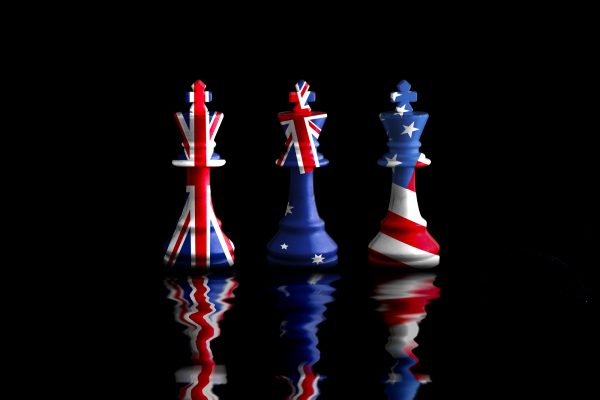
Since its establishment in 2021, AUKUS – the security arrangement linking Australia, the United Kingdom, and the United States – has sparked significant global debate. Paul Keating, former prime minister of Australia, made waves by calling the trilateral nuclear submarine agreement the “worst deal in all history.” China protested in strong terms as expected. The Malaysian and Indonesian governments were reserved, but also not excited about AUKUS.
Russia also joined the bench of critics. Given the animosity between Washington and Moscow, Russia’s opposition to AUKUS may seem like a foregone conclusion, but it’s worth examining in more detail.
Russia’s concerns regarding AUKUS can be distilled into three main reasons: the threat of nuclear proliferation, the re-emergence of SEATO-like alliance structures in the Asia-Pacific, and the potential for regional strategic transformation to spill over into economics.
Russia’s proposed alternative is also crystalizing, especially after publication of its refreshed foreign policy strategy last month. Russia will seek to use its available diplomatic capabilities to increase the role of local intergovernmental decision-making bodies.
Until AUKUS, defense-focused multilateral groupings in the Asia-Pacific region – including ANZUS and Five Eyes – were “light-touch” in their scope. They mostly focused on intelligence sharing and aligning capabilities or enabling interoperability.
AUKUS goes further than other alliances in Asia by bringing hardware that changes the regional strategic balance – even if, as Australia has repeatedly insisted, its nuclear-powered submarines never carry nuclear arms. Apart from the effect on the military balance of power, Russia is concerned about the precedent of proliferation and its potential to change established international norms.
Russia’s Deputy Foreign Minister Sergei Ryabkov argued that AUKUS is “a great challenge to the international nuclear non-proliferation regime.” The erosion of the concept of non-proliferation is a concern to Moscow’s interests globally, including in Europe.
While the Cuban Missile Crisis is an overused precedent, it is applicable to the case of AUKUS. It showed how quickly proliferation of advanced nuclear tech can lead great powers to the brink of conflict – and how difficult it is to roll back.
Second, Russia’s leadership does not consider AUKUS as a standalone entity. It is seen as an extension of a hardening network of global alliances led by the United States. Nikolai Patrushev, Russia’s security chief, voiced concern over “an attempt to create an Asian equivalent of NATO.”
While conceived for their own purposes, the Chip4 alliance and the Quad are seen as other layers of U.S.-led regional groupings. And arguably the deepening network of U.S.-led alliances heralds the re-emergence of SEATO-like structures. Russia considers the explicit targeting of China by these organizations a mirror image of NATO’s policy toward Moscow in Europe. Indeed, recent conversations around “AUKUS Plus” cement Russia’s concerns.
And for Moscow, this is the crux of the matter – AUKUS is yet another military organization that is not from the region nor for the region, and so is a threat to the delicate balance in the Asia-Pacific.
Third, the Asia-Pacific region is crucial to Russia’s economic plans and foreign policy strategy. Russia’s renewed Foreign Policy Concept places significant emphasis on Asia in terms of economic engagement. Russia plans to leverage its comparative advantages in resources, energy, space, and nuclear to enter rapidly developing markets across the Asia-Pacific. Continued non-alignment and a lack of sanctions, not a “pro-Russian bloc,” is key to Russian economic fortunes in the region.
In contrast, AUKUS has the potential to upset the strategic balance in the region. It is likely to prompt further great power competition, which is already seeping into trade restrictions, especially in the tech sector.
AUKUS is considered a threat to Moscow’s economic plan in Asia as a herald of bloc formation in the region. More countries potentially choosing sides in the global competition is likely to lead to a reduction in market access for Russia in Asia, which will be contrary to Moscow’s interests.
Given these concerns about AUKUS, how will Russia respond? In line with its new strategy, Russia will try to work closer with regional decision-making organizations to push back on U.S.-led blocs. This includes reaffirming the primacy of ASEAN, which some observers see as under threat from AUKUS; increasing the role of BRICS; and deepening bilateral relationships with friendlier countries with a presence in local institutions. The outlined approach aligns with Russia’s identity as a great power that values a multipolar world order.
As already observed by many writers, AUKUS may also push Russia and China closer together as they seek to establish their influence in the region, driven by shared norms and ideas about the role of great powers in international relations.
The motives for Russia’s concern about AUKUS are deep-rooted and strategic. Russia’s approach toward AUKUS is informed by Moscow’s view of global processes, including expansion of U.S.-led military alliances.
There is no clear solution to the geopolitical bifurcation Asia finds itself in. AUKUS will not roll back, while critics’ concerns will not subside. The course is set for a transformation of international architecture in Asia. Russia’s strategy is to be an active participant, supporting regional groupings instead of global ones, trade-based organizations against military blocs, and taking a principled stance against proliferation.
Why Does Russia Care About AUKUS?
Source: Frappler

0 Comments